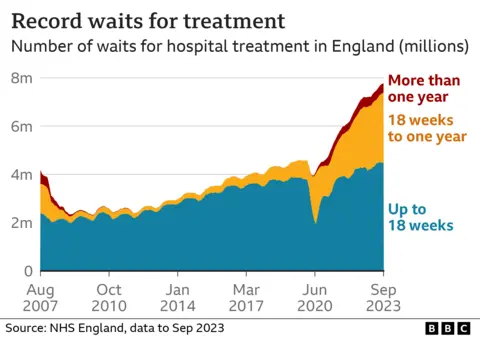One million people on more than one waiting list as NHS backlog grows
 Getty Images
Getty ImagesAbout one million people in England are on more than one waiting list for treatment, it has been revealed for the first time, as the NHS backlog hits a new record high.
There were 7.77 million waits for non-emergency care at the end of September - up from 7.75 million in August.
But analysis by NHS England has found that includes many people who are waiting for more than one treatment.
Most are on two or three waiting lists, but some will be on up to five.
Many will be elderly people waiting for a variety of non-emergency treatments, including everything from knee and hip replacements to those who may need drug therapies or physio.
The fresh insight has been provided after NHS England drilled down into the figures by using patients' unique NHS numbers.

It showed the backlog of 7.77 million waits involved an estimated 6.5 million patients - around 1 million of whom were waiting for more than one treatment.
The waiting list is now nearly 3.5 million higher than it was before the pandemic.
Royal College of Nursing chief nurse Prof Nicola Ranger said the government "had lost control" of waiting times.
"These lists have been growing for years and the shortage of nurses is one of the fundamental causes," she added.

Are you on one or more waiting list? Are you having to pay privately for treatment? Get in touch.
- Email [email protected]
- WhatsApp: +44 7756 165803
- Tweet: @BBC_HaveYourSay
- Upload your pictures or video
- Please read our terms & conditions and privacy policy

'Deep frustration'
The backlog has continued rising this year despite the prime minister's pledge to cut down waiting lists.
However, progress has been made on tackling the longest waits of more than 18 months.
Rishi Sunak has blamed strikes for the lack of progress.
The continued industrial action is estimated to have cost the NHS £1bn in this financial year in paying premium rates to staff to cover shifts, and in planning and preparing for walkouts.
The ones by doctors have proved to be the most disruptive - and still remain unresolved, although talks are under way between the government and the British Medical Association.
The NHS had asked for extra funding to cover the cost of strikes.
But this week it emerged its plea had been rejected, with the Treasury only agreeing to an extra £100m.
Instead, the NHS has been told it will have to use £200m of winter money and raid other budgets, including those originally earmarked for IT and maintenance, to tackle the backlog.
In return, the target for the amount of treatments the NHS is expected to have carried out has been relaxed - a further sign that the government accepts its push to tackle the backlog will take longer than first hoped.
Saffron Cordery, of NHS Providers, which represents hospitals, said there was a "deep sense of frustration" about the lack of extra funding.
"This will undoubtedly have knock-on consequences for the health service and patient care."
